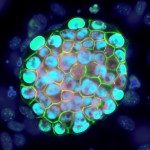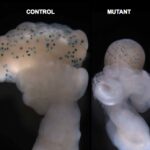Link to Pubmed [PMID] – 21191184
Cell Cycle 2011 Jan;10(1):108-17
During S phase, the replisome has to overcome many physical obstacles that can cause replication fork stalling and compromise genome integrity. Transcription is an important source of replicative stress and consequently, maintenance of genome integrity requires the protection of chromosomes from the deleterious effects arising from the interaction between nascent RNAs and template DNA, leading to stable DNA-RNA hybrids (R-loop) formation. We previously reported the essential role of Omcg1 (Ovum Mutant Candidate Gene) for cell cycle progression during early embryonic development. Here, we show that OMCG1 is a target of the cell cycle checkpoint kinases ATR/ATM and is essential for S phase progression in mouse embryonic fibroblasts. Using a conditional gene inactivation strategy, we demonstrate that OMCG1 depletion impairs cell viability as a consequence of DSB formation, checkpoint activation and replication fork collapse. We also show that no chromosome breaks were generated in non-cycling Omcg1-deficient cells. Furthermore, increased RNaseH expression significantly alleviated genomic instability in deficient fibroblasts suggesting that cotranscriptional R-loops formation contributes to the genesis of replication-dependent DSBs in these cells. Together with recent reports describing its participation to complexes involved in cotanscriptional processes, our results suggest that OMCG1 plays a role in the tight coupling between mRNA processing pathways and maintenance of genome integrity during cell cycle progression.

